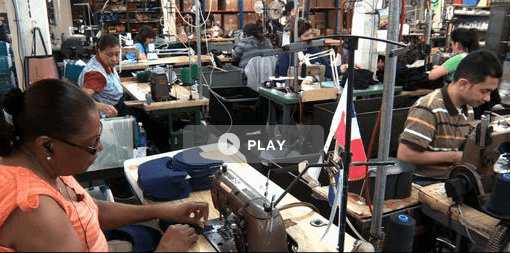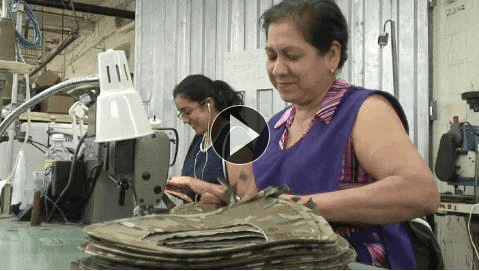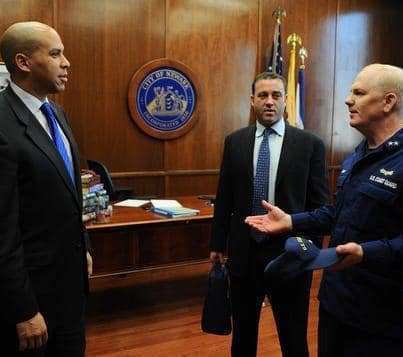NJBIZ: Newark Putting It All Together
Getting all the stakeholders on board is critical in push to help manufacturing expand.
Newark’s infrastructure and geographic advantages have drawn manufacturing to the city, but the Made in Newark movement says there are challenges, too. – (Photo By AARON HOUSTON)
Newark has become New Jersey’s urban manufacturing laboratory, as the Brick City engages stakeholders from business, government and education to help employers thrive while churning out products from clothing to chemicals, to paintbrushes and mattresses.
A key milestone in the three-year-old Made in Newark movement came in May, with the release of a Brookings Institution study that found Newark has drawn a cluster of diverse manufacturers that benefit from the city’s favorable geographic location, as well as its international port, rail and highway connections. But it also pinpointed serious challenges that can blunt Newark’s competitive edge: an aging workforce, insufficient investment in innovation and sustainability, and poor participation in regional and global markets.
Brookings fellow Nisha Mistry, a co-author of the report who also is an aide to Mayor Cory Booker, said Newark has a real concentration of manufacturing assets; getting them to perform more efficiently “will require the active involvement of many voices and institutions.”
Stakeholders looking to Newark’s manufacturing renaissance are hoping their involvement helps accomplish that. Among them are the New Jersey Institute of Technology, which wants to educate the next generation of shop floor leaders, and Rutgers Business School, which is launching the state’s first urban manufacturing resources hub through its supply-chain management program; both campuses are in Newark. The state Department of Labor’s advanced manufacturing talent network, launched in 2011 at NJIT, is working with all stakeholders, including community colleges and technical high schools, to train a pipeline of manufacturing workers in the skills needed on a computerized factory floor. The Newark Regional Business Partnership also is a major supporter of the city’s manufacturing initiative.
That level of involvement was the kind of thing Mitch Cahn envisioned when he helped launch the Made in Newark support group in 2011, with the help of Booker’s economic development team.
At the time, “I thought maybe there were a dozen manufacturers in town,” said Cahn, who launched his Unionwear apparel company in 1992 and has been in Newark for 12 years, where he now employs 110. When a research effort turned up 400 manufacturers in the city, “I was shocked,” he said.
Manufacturers, he said, have found “Newark is at the intersection of inexpensive space and abundant skilled labor.” But they tend to underfly the radar, because while they may employ a couple hundred people, they work in nondescript buildings scattered throughout the city. It’s hoped that the partnership with Newark’s universities can help power further growth in the sector.
“It’s very difficult to hire management in manufacturing, because individuals coming out of engineering schools and business school were not preparing for jobs in the manufacturing sector over the past 20 years,” said Cahn, who said his company makes baseball caps, backpacks and other textile products for companies seeking items made in America, including political campaigns, labor unions and the military. “Now that manufacturing is roaring back here, there’s a big gap.”
The challenge is finding factory managers who understand both manufacturing processes and new technology, he said: “In certain positions, we hire two people — someone with technological expertise and someone with manufacturing expertise — and hope they can work together.”
NJIT is eager to train the new factory management, said Donald Sebastian, its senior vice president for research and development. He said NJIT has long been committed to manufacturing: In 1995, he launched the New Jersey Manufacturing Extension Program, which provides consultants to manufacturers to help them boost efficiency, provide training and develop new product lines. Originally housed at NJIT, today NJMEP is an independent nonprofit in Morris Plains.
“We’ve never stopped beating the drum to get people to understand that we have to be a producer country, and this needs to be a producer state,” Sebastian said. “People have gotten back to the business of understanding that we need to make the things that we consume and that we sell, and that innovation is not just about clever products — it’s about cleverness in producing those products.”
Sebastian said NJIT is considering an undergraduate program to prepare engineers for manufacturing. He said industry is evolving, and factory leaders must be prepared to manage rapid changes in product life cycles.
“Small and midsized companies have to be part of the design process, they have to be part of the innovation and thought process,” Sebastian said. Years ago, an auto parts supplier might make the same General Motors part for a decade. “Now, you may be a supplier to three or four automotive manufacturers, and those platforms change on a three-year time cycle — you can’t do the same thing over and over and over again.”
He said NJIT hopes to convene groups of Newark industrial firms and help them “develop a sense of identity and community, and chart a course for growth.”
Gale Tenen Spak, associate vice president of continuing and distance education at NJIT, said the university is exploring ways to replenish the pipe of “technologists” — workers with the training and credentials for advanced manufacturing’s computer-driven workplace. One idea is for workers to take “stackable” industry-vetted courses leading to credentials “that are accepted for an associate’s degree leading to bachelor’s degree. Then, you have the ability for individuals to have that long-term career with a family-sustaining income.”
Meredith Aronson, who for the past two years has headed the state’s advanced manufacturing talent network, said the Brookings report revealed “food and textiles are substantial and important manufacturing activities in Newark,” and recognized that “we are not performing as aggressively as we need to in Newark with regards to exports.”
And while it may be difficult to find large parcels of land to locate a factory in Newark, the city could attract high-tech factories that need less space: “I see opportunity for urban or metro-focused manufacturing, because the footprint can be smaller in many cases” and they can tap the urban workforce, she said.
E-mail to: beth@njbiz.com
On Twitter: @bethfitzgerald8
source: http://www.njbiz.com/article/20130624/NJBIZ01/306219989/Putting-it–all-together
Unionwear in Wearables Fashion Sense Channel “USA Made” segment
The resurgence of domestic apparel manufacturing (including Unionwear) featured on the Wearables Fashion Sense Channel this month. All of these brands are available from your local promotional products professional, screen printer, or embroiderer.
4 USA Made Items That Cost Less Than Imports
With labor costs continuing to skyrocket in China, transportation costs trending upward, and importers piling on currency hedge premiums, a number of promotional items have become less expensive to produce domestically. Four places to look:
1. Products made out of expensive materials. Pricey leathers and performance fabrics make the difference in labor costs insignificant. This bag uses $40 worth of leather whether it’s made in China or New Jersey. If labor costs are $9 domestically and $3 overseas, the FOB price will be $49 vs. $43–and the shipping, duties, taxes, cost of capital and other import headaches will more than eat up the cost savings. That’s why so many leather bags are made in the USA or in places even more expensive, like Italy.
2. Bulky products that are expensive to ship. Look for hard cases, coolers, laptop bags, products that don’t ship flat or nest. We recently made a hard case that was three feet wide by two feet high–it was more cost effective for the client to buy domestically than to pay to ship mostly air around the world.
3. Products with unnecessary bells and whistles. When labor was almost free, the Chinese often engineered products to “make work”, and little has changed. Evolved US factories re-engineer, eliminating unnecessary labor from imported products and build dedicated, lean production lines to keep labor costs low in a high wage environment.
4. Small batch customization. Import unit pricing may still be cheaper on most items, but there is a large overhead with every transaction. Language differences require tech packs. Sample approval and product development cost a fortune. As a result, customization in small quantities is cost prohibitive. Not domestically: you can do all over prints, custom dye lots, custom patterns, and panel embroideries by the hundreds–not tens of thousands.
BarackObama.com Now Offering Six Unionwear Hats
BarackObama.com Now Offering Six styles of Unionwear Hats: Show your support for President Obama at the ballpark and everywhere else with our 2012 hat. Made in the USA.
Anne Hathaway Rocking a Fleabag, Made Right Here at Unionwear
Corporate USA-Made Buying Sees Uptick
Another day, another study that 75% of Americans are willing to pay more for USA Made merchandise.
Corporate logo apparel magnifies this phenomenon since companies are sensitive to being judged on their commitment to everything from helping rebuild our economy to the working conditions at their vendors’ factories. Here are six situations where a company will pay a small premium to see Made in USA on a promotional product that features its logo:
Company Store Catalogs/Fulfillment Programs
Companies that charge employees for corporate logo gear at far more likely to offer Made in USA options because it’s a risk free way to test their employees’ willingness to shell out a couple bucks extra for USA Made, while showing their support for domestic manufacturing. These companies may continue to buy their giveaways overseas unless they are…
Domestic Manufacturers
USA manufacturers such as GM, GE, John Deere, and Harley Davidson are already aware of the rapidly shrinking premium paid for USA Made. Most push “Made in USA” in their marketing and want to avoid appearing hypocritical saving money by putting their logo on an overseas product.
Other Industries Identifying with USA Made
Companies that promote their commitment to adding value with US labor in industries such as food processing, bottling, construction, energy and even technology, graphic design, and web development buy USA promos for the same reasons as domestic manufacturers.
Regulated Utilities/Telecom with strong Unions
Public Utilities and cable and phone giants such as AT&T and Verizon have been at the forefront of buying USA made wearables for their workers, as a nod to both the gigantic unions who represent their field workers and the politicians who must approve the usage of public bandwidth, easements, and other resources.
Trade Justice, Green, and other Social Ventures
Corporations with Social Ventures departments and/or a strong stated commitment to the environment or workers rights will buy USA Made–or at least avoid associating with countries known for sweatshops and lax environmental regulation.
Companies with Clients Highly Sensitive to “USA Made”
Unions, federal and state governments, the military, and political campaigns take issue with anything not USA Made, so companies giving away merch at events that cater to these industries take pains to endorse “USA Made”. Examples are financial services companies that cater to unions, military contractors, and DOT vendors.
Sources:
http://www.crainsnewyork.com/article/20130203/RETAIL_APPAREL/302039979
Unionwear: Made in NJ on NJTV
 State of Manufacturing in New Jersey: In part 2 of New Jersey, NJ Today’s David Cruz reports on how a public-private partnership is helping Unionwear compete in the international market place.
State of Manufacturing in New Jersey: In part 2 of New Jersey, NJ Today’s David Cruz reports on how a public-private partnership is helping Unionwear compete in the international market place.
BCDC – Newark, It’s Your Move
BCDC – Newark, It’s Your Move: Newark Highlight video for Brick City Development Starring: Chip Hallock – Newark Regional Business Partnership, Dr Lezli & Chris Harvell – DentalKidz, Don Katz – Audible.com, Mitch Cahn – Unionwear, Joe Taylor – Panasonic Corporation, Dr dt ogilvie – Rutgers Business School, Marketing Agency/Art Direction – Princeton Partners, Video Production – Visitivity Media.
Coast Guard Admiral Tours Unionwear
 Newark, N.J. – Mitch Cahn (right), President of Unionwear, provides a tour of his Newark, N.J., ball cap manufacturing facility to Coast Guard Capt. Robert R. Mckenna, Commander of Community Services Command, Bernard Reiner, a Coast Guard Auxiliary congressional liaison officer, Rear Adm. Daniel R. May, Commander of Personal Service Center, Wednesday, Dec. 14, 2011. The Coast Guard presented Unionwear a Certificate of Appreciation for their outstanding efforts, providing on-time delivery of the Coast Guard’s new standard uniform ball cap.
Newark, N.J. – Mitch Cahn (right), President of Unionwear, provides a tour of his Newark, N.J., ball cap manufacturing facility to Coast Guard Capt. Robert R. Mckenna, Commander of Community Services Command, Bernard Reiner, a Coast Guard Auxiliary congressional liaison officer, Rear Adm. Daniel R. May, Commander of Personal Service Center, Wednesday, Dec. 14, 2011. The Coast Guard presented Unionwear a Certificate of Appreciation for their outstanding efforts, providing on-time delivery of the Coast Guard’s new standard uniform ball cap.
Coast Guard Recognizes Newark’s Unionwear for Outstanding Support
Coast Guard Recognizes Local Business for its Outstanding Support: US
Coast Guard and the Department of Homeland Security recognized Newark’s Unionwear for delivering 50,000 units of newly developed uniform headwear in under 90 days.
Inside, Outside U.S.A.
Inside, Outside U.S.A.: Presidents of American Apparel, Unionwear, Jensen discuss the economics behind the surge in domestic apparel production.
Video: Unionwear in Newark Provides ‘boonie caps’ for U.S. Military
 Video: Unionwear in Newark provides ‘boonie caps’ for U.S. Military: About half of the production in Newark’s Unionwear facility is military-related – which keeps the uniforms that our servicemen wear truly “Made in America”. (Video by Sarah Portlock / The Star Ledger)
Video: Unionwear in Newark provides ‘boonie caps’ for U.S. Military: About half of the production in Newark’s Unionwear facility is military-related – which keeps the uniforms that our servicemen wear truly “Made in America”. (Video by Sarah Portlock / The Star Ledger)
‘Made in Newark’ Initiative Hopes to Introduce Visitors to City’s Businesses, Locally Made Products
‘Made in Newark’ initiative hopes to introduce visitors to city’s businesses, locally made products: Newark – Activity buzzed inside a nondescript, one-story manufacturing building near Newark’s Branch Brook Park. Workers from Unionwear carefully cut zippers to length for royal blue gym bags emblazoned with a block-lettered “Made in Newark” logo on the side.

 Union Made In USA
Union Made In USA
